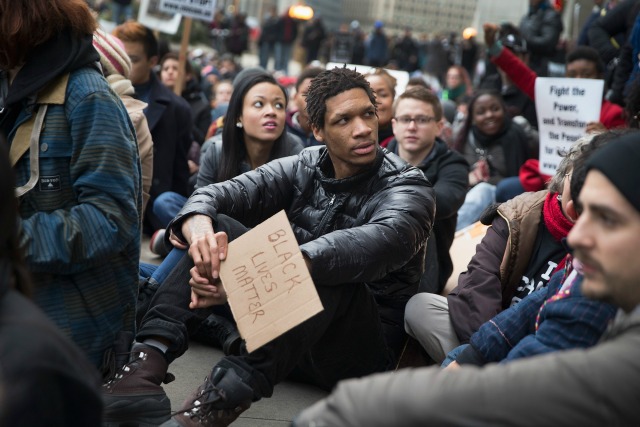
CHICAGO, IL – DECEMBER 13: Demonstrators stage a sit-in along Michigan Avenue to protest police abuse. The protests was one of many staged nationwide in response to grand juries’ failure to indict police officers involved in the the deaths of Michael Brown in Ferguson, Missouri and Eric Garner in New York. (Photo by Scott Olson/Getty Images)
You’ve hit the streets. You’ve carried picket signs. You’ve joined choruses “No Justice, No Peace,” “I Can’t Breathe,” and even “Fight the Power.” You were angered not only at the deaths at the hands of police of Mike Brown, Eric Garner, Tamir Rice, and Akai Gurley, but the countless others whose names you may never know.
You go home, still fuming about the injustice of it all, tear gas in Ferguson fresh in your memory. Then when you get a chance to breathe, you ask: “Now what?” Well, none of this is over. Not by a longshot.
There’s still a lot more to do, but if history is any guide there’s more work to be done in legislatures, in offices, in committees and even in schools. Even if street demonstrations aren’t your thing and you’re looking for more perfunctory but effective ways to change the game, there is a lot you can do. So here are five things you can take up to move the fight for justice forward.
1. Learn and teach everything you can about the law where you are.
One of my favorite things to study in history is the Montgomery Bus Boycott. Many of us think it was just Rosa Parks sitting on a bus and refusing to give up her seat. But the truth is the entire action was a well-planned, brilliantly executed act of civil disobedience. Unsung heroes of that movement included Fred Gray, who represented Parks and Claudette Colvin and ultimately the Montgomery Improvement Association all the way to the Supreme Court; E.D. Nixon, a longtime civil rights activist; and JoAnn Robinson, president of the Women’s Political Council.
Each of them were well-versed in what the law could and couldn’t do when they decided to act. They taught the many others involved in the boycott, and although the State of Alabama basically broke every human rights law guaranteed to U.S. citizens, they steadfastly marched on knowing they had done nothing wrong. The result was the entire country seeing regular working people subject to violations of their right to “life, liberty, and the pursuit of happiness.” By the time the boycott got to the Supreme Court, they had won both legal and public sentiment and Montgomery’s segregation law was declared unconstitutional.
2. Get an audience with local, state, and Congressional lawmakers.
In grade school we learn that there are three branches of government: executive, judicial, and legislative. The executive branch (mayors, governors, presidents) are in charge of implementing and enforcing the law; the judicial branch (criminal, civil and appellate courts) are in charge of interpreting and administering the law; and the legislative (U.S. Senate, U.S. House, state senates and assemblies and town and city councils) are in charge of making the law.
Powerful people spend half their time finding ways to rub up against senators, assemblymen, aldermen, and councilmen and women to get laws passed and policy made that will benefit them. They don’t even see a need to march and protest because this is how they’ve wielded power since republics have existed. Taking a page from their playbook, if you reach people in their offices, the places where they campaign —and if you can afford it, their fundraising events—they are more likely to listen to you. They all have staffs of people whose job it is to deal with their constituencies and that is where you start drafting laws and policies that will change law enforcement policy and, judicial guidelines and the like. It’s good to have a lawyer on your side that will help translate what you want into bureaucratic jargon that politicians understand.
3. Get on juries and stay there until the trial is finished.
Lots of people say that “the system is broken.” It is not. The “system” is working exactly the way it was designed, and it wasn’t designed with black folks in mind. In Michelle Alexander‘s groundbreaking “The New Jim Crow,” she describes the American criminal justice system as something that deliberately works toward the incarceration of black men; a structure that achieves racism while avoiding racist rhetoric. By the time many brothers see their legal counsel, they are told to take a guilty plea for less time—even if they are innocent. When this happens they are agreeing to be marked for life as a convict, placing them in a permanent underclass.
This is a way for the criminal justice system to quickly dispose of people without giving them full due process. We don’t have to let this happen. If the accused knew that they were more likely to get a fair and impartial jury trial, they may be more likely to avoid taking the plea and sitting to be judged “by a jury of their peers.” Evidence could be weighed, questions about the validity of testimony could be asked, and you can be part of dealing the justice that we all have a right to. And if worse comes to worse, you can practice jury nullification (click here to read more on that). But if you do anything you can to get out of jury duty, someone’s scared teenaged kid who may well have nothing to do with the crime he is accused of could be looking at having his life taken away from him. It makes you wonder if The Central Park Five would have been locked up if folks sharing their background had been eager to get on the jury in their case.
4. Fight as hard as you can for people’s right to vote.
This can’t be understated. One of the main complaints in the black community is that not enough people vote. But I’m not so quick to make that assumption. I think a reason that people in our communities fail to show up at polls is because they couldn’t do anything when they get there. A grossly disproportionate number of people in predominantly African American areas have been convicted of crimes and misdemeanors, and that removes the ability to vote. In some states (Florida, Iowa, Kentucky), it’s permanent. In others it’s for a finite time but you have to jump through several difficult hoops to get your rights back. Still in others, you can vote as soon as you’re out of jail and off parole. Only in Maine and Vermont do you never lose your voting rights, even in prison.
Couple that with the ridiculous voter ID laws that are being passed in states that are trying very hard to disenfranchise people and, yeah, good old-fashioned apathy, we’ve got a recipe for nothing ever changing. If there were no obstacles for people who are tripped up by law, politics and bureaucracy, people would feel more encouraged to go to the polls. It’s not enough to say “people died for our right to vote.” They did, that’s clear. But one thing that isn’t talked about is that our right to vote is seriously impeded to the point that we’re virtually blocked from doing it.
Looking back at this year’s midterm elections, it’s clear that the voters who gave control of the Senate to the Republican Party did so because they could. Nothing stopped them. If there were no hindrances to black people, we could literally dictate who gets to choose our congressional districts and so much more.
5. Speak in schools and get involved with young people.
Maybe this is the most powerful thing you can do. Throughout history, repressive regimes, dictatorships, police states and arrogant potentates all had to fear young people because they had the least to lose. But without guidance, young people will become automatons, willing to do as they are told, following the status quo and in the case of poor and inner city youth, become a lumpenproletariat who comes to think of racial profiling and unwarranted searches as part of life.
This doesn’t have to be. The energy you take to the streets should also be taken to the youth. You can educate them for example on what to do in a police stop, you can teach them basics about law and procedure, you can teach them how to organize themselves and raise funding, you can even have them question what they are being taught by their educational bureaucracies. Most important of all, as long as it is accurate, you can give them the wisdom of your institutional knowledge. Believe me, when they know you care, they will soak it up and won’t leave you alone until you give them everything you know. When young people can call B.S. and know their rights and what kind of power they have, entire civilizations can change and you can be the impetus to that.
Madison J. Gray is a Brooklyn, N.Y.-based multimedia journalist specializing in urban issues and criminal justice. He writes for NewsOne on the subject of Black males in America. Follow him on Twitter:@madisonjgray
5 Things You Can Do After The Protests was originally published on newsone.com














